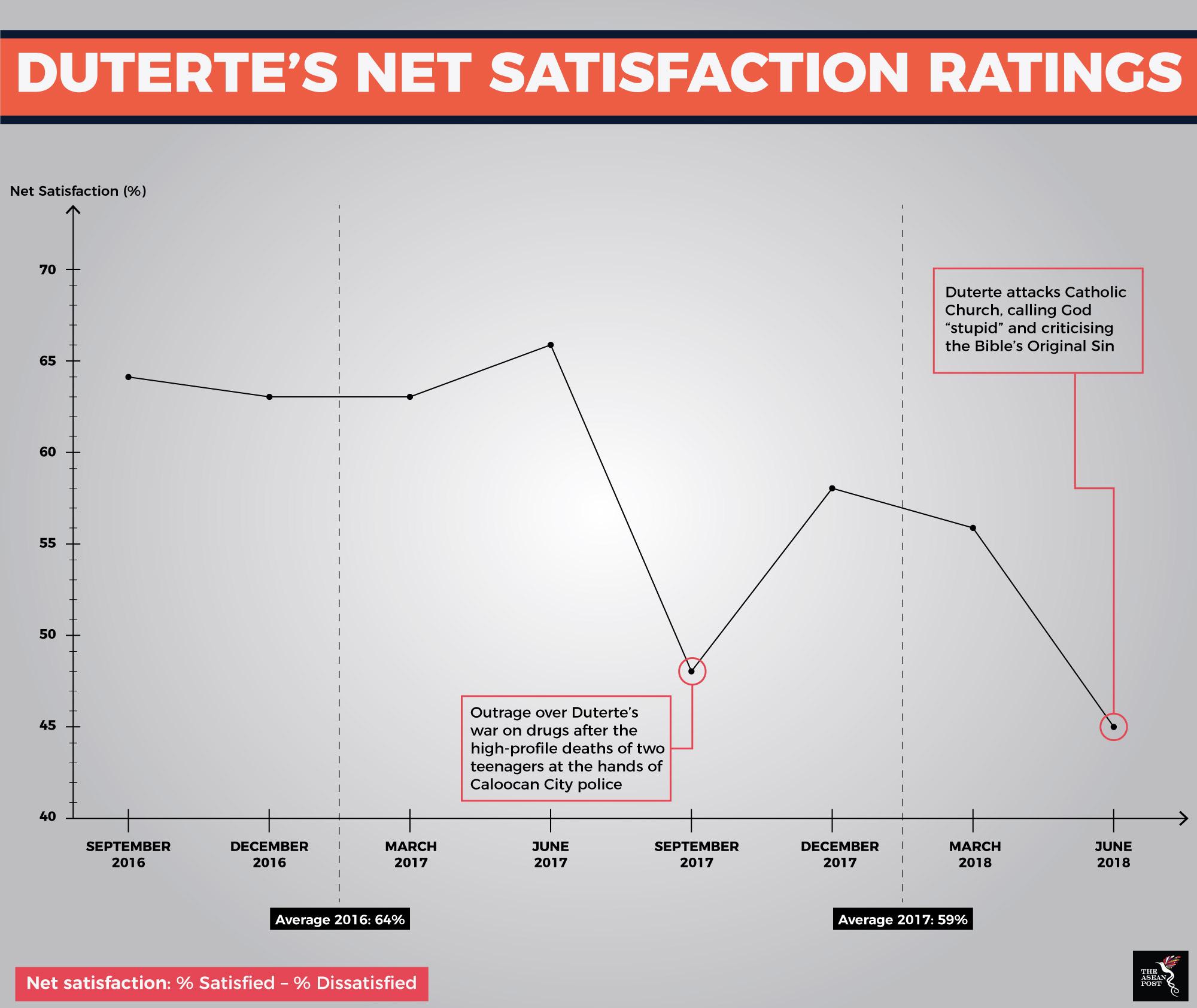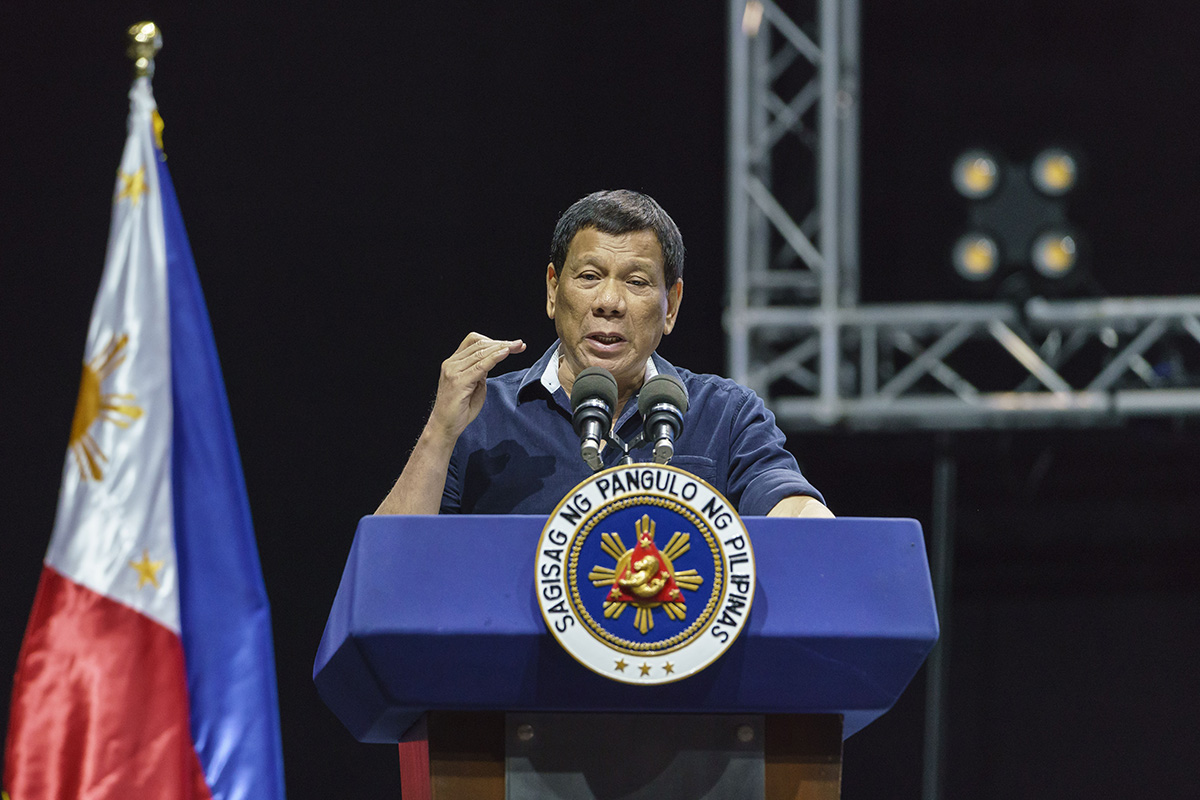Philippine President, Rodrigo Duterte’s satisfaction ratings has dropped to its lowest since he assumed office according to an independent survey by Manila based pollster, Social Weather Stations (SWS). Compared to the first quarter of the year, Duterte’s net satisfaction ratings fell 11 percent to 45 percent dropping below his previous low of 48 percent in September 2017.
“Net satisfaction” refers to the percentage of respondents who are satisfied minus those who are not. This metric has been used as a gauge of the popularity of the nation’s top leadership position for over three decades.
Duterte’s 11-point decline was mainly due to huge declines in Metro Manila (20 points), Visayas (18 points), Balance Luzon (six points) and Mindanao (six points). As such, his satisfaction grade fell by one from “very good” to “good” in the survey which polled 1,200 Filipinos.
According to the SWS methodology for satisfaction ratings, a score of 70 and above is considered excellent; 50 to 69 is very good, 30 to 49 is good and 10 to 29 is moderate.
Duterte has previously enjoyed a stellar high satisfaction ratings since assuming office, peaking at 66 in June 2017.
However, he now remains unperturbed by the drop in his ratings. He told a news conference that he doesn’t care about the poll numbers, saying that it “does not interest me at all.”
Church factor
The survey coincided with the week when Duterte attacked the Catholic Church after bishops and priests condemned his government’s brutal anti-drug crackdown. He called God “stupid” and criticised the Bible’s creation story of Adam and Eve and Original Sin.
“Who is this stupid God?” the Philippine leader asked. “You created something perfect and then you think of an event that would tempt and destroy the quality of your work.”
Catholics account for more than 80 percent of the Philippines’ population and many from the church and regular citizens alike did not take too kindly to Duterte’s remarks. The Philippine Council of Evangelical Churches denounced the President’s comments, calling it “completely inappropriate.”

Source: Social Weather Stations
This isn’t the first time Duterte has locked horns with the Church. In 2015, he called Pope Francis a “son of a whore” for causing a traffic jam in downtown Manila during the latter’s official visit to the country. Duterte later apologised for his irate comments in a letter to the Vatican.
Besides Duterte’s unabashed outbursts, the Philippines is also contending with a growing culture of impunity as a result of the government’s violent war on drugs which has left thousands of dead. Thus far, three priests have also been killed. While there isn’t an obvious pattern as to why Catholic priests have been targeted, it is largely held that this is caused by a spill-over of an environment of impunity in the country which is now affecting other facets of society.
Lessons from history
Duterte who remains unfazed amid criticisms levelled at him by the church should rightly take a leaf out of the Philippine history textbook.
During the People Power Revolution in the 1980s, the Catholic Church, led by the late Cardinal Jaime Sin, played an influential role in marshalling the masses against the dictatorial rule of Ferdinand Marcos. The Church were for the most part, quiet, in the earlier phases of the revolution. However, their involvement intensified – lending moral and spiritual support – amid an increase in incidences of injustice and brutality towards regular civilians. As such, Duterte should not underestimate the potential backlash from the Church in the event it is provoked.
Nevertheless, he may have one more trick up his sleeve.
A new Philippine constitution is currently in the works, shifting the unitary republic to a more federalist state to provide additional autonomy to separate regions in the country. If the new constitution is adopted, Duterte could extend his stay in office by up to eight years. Under current laws, he would have to step down in 2022, when his six-year term is up.
The constitutional limits on the President’s tenure were put in place after the country’s horrific experience with the Marcos regime. However, if these reforms are passed, they could provide a legal loophole for Duterte to remain in power longer than other post-Marcos presidents.
Given the changing political landscape, there is a possibility that Filipinos could to a certain extent be forced to live under a similar dictatorial rule that they experienced during the Marcos years. It would be wise for politicians and citizens alike to keep this in mind as they chart the country’s political future.
